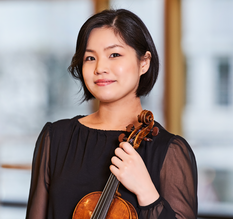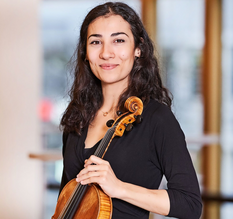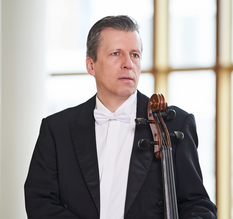

So 02.11.2025, 11.00 Uhr | Elbphilharmonie, Kleiner Saal
Herbert Howells: Rhapsodisches Quintett für Saxophon und Streichquartett op. 31
Kurt Weill: Suite aus der Oper "Aufstieg und Fall der Stadt Mahagonny" - Bearbeitung für Saxophon, Klavier und Streichquartett von Wijnand van Klaveren
Dmitri Schostakowitsch: Klavierquintett g-Moll op. 57
Saxophon: Hiroaki Taewook Ahn
Violine: Yuri Katsumata-Monegatto
Violine: Kostas Malamis
Viola: Iris Icellioglu
Violoncello: Markus Tollmann
Klavier: Petar Kostov

Yuri Katsumata-Monegatto wurde 1992 in Yokohama geboren und begann im Alter von sieben Jahren Geige zu spielen. Ihre musikalische Ausbildung erhielt sie an der Universität der Künste Tokio bei Sonoko Numata sowie an der Universität der Künste Berlin als eine Stipendiatin des DAAD bei Nora Chastain und Marlene Ito. Weitere musikalische Impulse erhielt sie u.a. auch durch das Artemis Quartett. Orchestererfahrung sammelte sie im Deutschen Symphonie-Orchester Berlin als Akademistin und im Gewandhausorchester Leipzig sowie bei zahlreichen internationalen Festspielen wie dem Verbier Festival, dem Schleswig-Holstein Musik Festival und dem Pacific Music Festival. Yuri Katsumata ist Preisträgerin mehrerer Wettbewerbe. Als Solistin spielte sie zahlreiche Konzerte, u. a. Krzysztof Pendereckis Doppelkonzert unter der Leitung des Komponisten. Seit 2020 spielt sie im Philharmonischen Staatsorchester Hamburg.

Kostas Malamis wurde 1993 in Athen (Griechenland) geboren. Er studierte an der Hochschule für Musik und Theater in München und schloss seinen Bachelor bei Olga Voitova-Bloch und Master bei Lena Neudauer ab. Während seines Studiums besucht er regelmäßig Meisterkurse von Christoph Poppen und Rudens Turku. Orchestererfahrung sammelte er beim Georgischen Kammerorchester Ingolstadt als Mitglied der 1.Violinen und bei der Deutsche Oper Berlin, wo er als Akademist und mit einem Zeitvertrag in den 2. Violinen tätig war. Seit Februar 2023 spielt er im Philharmonischen Staatsorchester Hamburg.

Die in Izmir geborene Bratschistin Iris Icellioglu entdeckte ihre Leidenschaft für die Bratsche im Alter von neun Jahren. Sie begann ihr Studium an der Dokuz Eylül Hochschule für Musik in Izmir bei Pinar Dinçer und setzte es bei Prof. Dr. Çetin Aydar und Prof. Hartmut Lindemann fort. 2016 schloss sie ihr Bachelor-Studium mit Auszeichnung ab. Ihr Masterstudium begann sie bei Prof. Roland Glassl und setzte es später bei Prof. Pauline Sachse an der Hochschule für Musik Lübeck fort, wo sie erfolgreich abschloss. Sie hatte die Gelegenheit, an Meisterkursen von bedeutenden Musikern wie Emile Cantor, Ruşen Güneş, Ron Ephrat, Máté Szücs und Eberhard Feltz im Bereich der Kammermusik teilzunehmen. Während ihres Studiums in Deutschland wurde sie mit drei verschiedenen Kammermusikgruppen mit dem Yehudi Menuhin Live Music Now-Stipendium ausgezeichnet.
Zwischen 2015 und 2017 war sie festes Mitglied des Karsiyaka Kammerorchesters. Später war sie Teil der Orchesterakademie des Philharmonischen Staatsorchesters Hamburg und trat in Orchestern wie dem Rundfunk-Sinfonieorchester Berlin, den Hamburger Symphonikern und dem NDR Elbphilharmonie Orchester als Gastkünstlerin auf.
Sie ist mit dem akademischen Orchester Dokuz Eylül und dem Karsiyaka Kammerorchester als Solistin aufgetreten. Im Rahmen des 45. Istanbul Festivals gewann sie den Wettbewerb „Festival sucht ihre junge Solist*in“ und trat als Solistin mit dem DESO unter der Leitung von Hakan Şensoy auf.
Seit 2022 ist Icellioglu festes Mitglied des Philharmonischen Staatsorchesters Hamburg. Sie hat mit Dirigenten wie Jonathan Nott, Vasily Petrenko, Alan Gilbert, Kent Nagano, Vladimir Jurowsky und Ádám Fischer zusammengearbeitet und trat als Orchester- und Kammermusikerin in weltberühmten Konzerthallen wie Carnegie Hall, Berliner Philharmonie, Elbphilharmonie, Suntory Hall und Sala São Paulo auf.

Markus Tollmann erhielt seinen ersten Cellounterricht mit sieben Jahren. 1984 ging er als Jungstudent an die Musikhochschule in Detmold zu Irene Güdel, wo er auch ab 1988 sein Vollstudium begann. Von 1991 bis 1992 studierte er in London bei William Pleeth und wechselte anschließend an die Musikhochschule in Lübeck zu Klaus Stoppel, wo er auch 1994 sein künstlerisches Diplom ablegte. Die Teilnahme an internationalen Meister- bzw. Kammermusikkursen, u. a. bei Zara Nelsova, Bernard Greenhouse, Gerhard Mantel, Mitgliedern des Amadeus Quartetts sowie dem Euler-Quartett, Basel rundeten seine Ausbildung ab. Seit Ende 1993 spielt er im Philharmonischen Staatsorchester Hamburg und wurde dort 1994 als Vorspieler der Cellogruppe fest engagiert.

Petar Kostov erhielt seine Ausbildung bei Konrad Elser an der Musikhochschule Lübeck, sowie in Wien. Er besuchte Meisterkurse bei Andrzej Jasiński, Ludmil Angelov, Boris Berman, Paul Badura-Skoda, Alexander Jenner und Bozhidar Nojev.
Er ist mehrfacher Preisträger nationaler und internationaler Klavier- und Kammermusikwettbewerbe, u. a. beim Internationalen Kammermusik Festival "Allegro Vivo“.
Im Rahmen von „Wien Modern 2018“ spielte Petar Kostov im Wiener Konzerthaus bei der gesamten Aufführung des Sequenze-Zyklus von Luciano Berio. Im Wiener Radiokulturhaus spielte er 2016 das Klavierkonzert von Geirr Tveitt "Aurora Borealis“ uns das Klavierkonzert von Igor Stravinsky unter Maestro Toshiyuki Shimada (Yale Symphony Orchestra) und gestaltete 2015 den Klavierpart in Schönbergs "Ode an Napoleon". Sein Debüt mit Orchester gab er 2013 mit dem Orchester der Staatsoper Plovdiv. Er ist ein gefragter Kammermusikpartner und musiziert mit verschieden Musiker und Ensembles.
Seit 2020 ist Petar Kostov als Pianist für das Hamburg Ballett und die Schule des Hamburg Balletts an der Staatsoper Hamburg tätig.
Die Klangwelten der Kammerkonzerte des Philharmonischen Staatsorchesters Hamburg sind so unterschiedlich wie die Charaktere der Musiker:innen, die darin agieren. Die Anforderungen im Orchestergraben sind oft durch die Größendimension und die Vielfalt der Stimmen geprägt. Kammermusik hingegen reduziert diese Dimension auf kleinere Ensembles und ermöglicht eine intime musikalische Interaktion. Wie in einem Dialog treffen verschiedene Meinungen aufeinander, neue Ideen entstehen, entwickeln sich während des Spiels und eröffnen so einen kreativen Raum für spontane Entfaltung.
Ort: Elbphilharmonie, Kleiner Saal, Platz der Deutschen Einheit 4, 20457 Hamburg